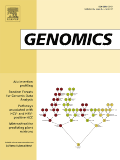
Phenomics
Scope & Guideline
Bridging Biology, Agriculture, and Environmental Science.
Introduction
Aims and Scopes
- Integrative Phenomic Research:
The journal emphasizes the integration of phenomic data with genomic, proteomic, and metabolomic information to unveil the multifactorial nature of diseases and health conditions. - Clinical Applications of Phenotyping:
Research published in 'Phenomics' often explores the clinical implications of phenotyping, including its role in personalized medicine, disease prediction, and therapeutic interventions. - Methodological Innovations:
The journal highlights advancements in methodologies for phenotyping, including imaging techniques, high-throughput data analysis, and machine learning applications. - Focus on Multimodal and Multi-Omics Approaches:
There is a strong emphasis on multimodal approaches that combine various data types, such as clinical data, imaging, and omics data, to provide comprehensive insights into health and disease. - Cultural and Ethnic Considerations in Phenomic Studies:
The journal also addresses the importance of cultural and ethnic diversity in phenomic research, particularly in the context of traditional medicine and population-specific health issues.
Trending and Emerging
- Cancer Immunotherapy and Phenotyping:
There is a growing focus on the role of phenotyping in cancer immunotherapy, particularly regarding the immune microenvironment and personalized treatment strategies. - Microbiome Research:
Research on the human microbiome and its implications for health and disease is increasingly prevalent, emphasizing its role in metabolism, immunity, and chronic diseases. - Machine Learning and AI in Phenomics:
The integration of machine learning and artificial intelligence in phenomic research is on the rise, particularly in analyzing complex data sets and enhancing diagnostic accuracy. - Aging and Age-Related Diseases:
Studies focusing on aging and age-related diseases are emerging, reflecting an increased interest in understanding the phenotypic changes associated with aging and their implications for health. - Personalized and Precision Medicine:
The trend towards personalized and precision medicine is evident, with research increasingly emphasizing individualized approaches based on phenotypic data and genetic profiles.
Declining or Waning
- Traditional Diagnostic Methods:
There is a noticeable decline in research focused on traditional diagnostic methods, as newer technologies and methodologies are increasingly preferred for their accuracy and efficiency. - Single-Omic Studies:
Research focusing on single-omic approaches (e.g., genomics alone) is becoming less common, with a trend towards integrating multiple omics for a more holistic understanding of phenotypes. - Generalized Disease Models:
Studies that utilize generalized models for disease without considering individual phenotypic variations are appearing less frequently, as the emphasis shifts towards personalized and precision medicine. - Exploratory Studies without Clinical Application:
Exploratory studies that do not directly translate to clinical applications are becoming less prevalent, as the journal increasingly prioritizes research with immediate relevance to patient care and outcomes. - Basic Biological Mechanisms:
There appears to be a waning interest in basic biological mechanisms without a direct link to phenotypic expression or clinical relevance, as more applied research takes precedence.
Similar Journals

AMERICAN JOURNAL OF MEDICAL GENETICS PART C-SEMINARS IN MEDICAL GENETICS
Transforming Insights into Genetic Solutions for Tomorrow.AMERICAN JOURNAL OF MEDICAL GENETICS PART C-SEMINARS IN MEDICAL GENETICS is a premier peer-reviewed journal published by Wiley, focusing on the intricate and evolving field of medical genetics. With its ISSN 1552-4868 and E-ISSN 1552-4876, the journal has established itself as a significant resource for researchers, professionals, and students alike, addressing cutting-edge developments in genetic research and clinical practice. Ranked in the top quartile (Q2) in both Genetics and clinical Genetics categories for 2023, it maintains an impressive Scopus ranking, positioning it within the 75th and 71st percentiles for Medicine and Genetics respectively. The journal encourages open access to its content, promoting wider dissemination of knowledge and fostering collaboration among medical genetics experts. From its inaugural issues in 1980 to its ongoing publications, the journal aims to bridge the gap between genetics research and its clinical applications, providing insights that reflect the latest advancements in the field. As it continues to serve the global medical community, the AMERICAN JOURNAL OF MEDICAL GENETICS PART C remains a vital source for those seeking to understand the complexities of genetic disorders and their implications for health and disease.

HEREDITY
Illuminating Genetic Pathways: Your Source for Cutting-edge ResearchHEREDITY is a prestigious academic journal published by SpringerNature, specializing in the dynamic fields of Genetics and Genetics (Clinical). With a history of excellence since its inception in 1947, this journal has established itself as a significant contributor to the understanding of genetic research, addressing both foundational principles and clinical applications. Operating without an open access model, it maintains a strong reputation with an impact factor that reflects its rigorous peer-review process and high-quality submissions, ranking in the top quartiles of its category as evidenced by its Q2 classification in Genetics and Genetics (clinical) for 2023. Further, HEREDITY holds commendable positions in Scopus rankings, illustrating its influence within the field, currently placed #21 out of 99 in Medicine (Clinical Genetics) and #87 out of 347 in Biochemistry, Genetics, and Molecular Biology (Genetics). Researchers, professionals, and students are invited to explore the latest discoveries and advancements in genetics through this esteemed journal, contributing to the broader discourse and innovation within the field.

Evolution Letters
Pioneering innovative insights in ecology and genetics.Evolution Letters is a premier Open Access journal published by Oxford University Press, dedicated to advancing research in the interdisciplinary fields of Ecology, Evolution, and Genetics. Since its launch in 2017, this journal has rapidly established itself as a leading platform for high-quality research and innovative studies, as reflected by its impressive Q1 quartile rankings in both Ecology, Evolution, Behavior and Systematics and Genetics for 2023. With a remarkable Scopus ranking placing it in the top 3% in its categories, Evolution Letters serves as a vital resource for scholars and practitioners seeking to understand the complexities of evolutionary processes and genetic developments. The journal’s commitment to Open Access ensures that groundbreaking research is freely available to the global scientific community, fostering collaboration, discovery, and progress in these critical fields of study.

AoB Plants
Leading the way in plant science advancements.AoB Plants is a distinguished open-access journal published by Oxford University Press, dedicated to advancing the field of plant science. Since its inception in 2009, this journal has played a pivotal role in disseminating high-quality research that encompasses a wide range of topics including plant biology, ecology, and biotechnology. With an impressive impact factor and a ranking in the Q1 quartile for Plant Science, AoB Plants is recognized for its innovative contributions and scholarly rigor, ranking #129 out of 516 in the Scopus Agricultural and Biological Sciences category, placing it in the 75th percentile among its peers. By promoting open-access availability of research findings, the journal empowers researchers and practitioners alike, facilitating greater collaboration and knowledge sharing in the global scientific community. Situated in the heart of the United Kingdom, AoB Plants continues its commitment to providing a platform for pioneering research and developments in plant science, thus fostering a deeper understanding of the crucial roles that plants play in our ecosystems and economies.

Annual Review of Biomedical Data Science
Transforming Data into Life-Saving InsightsAnnual Review of Biomedical Data Science, published by ANNUAL REVIEWS, stands as a premier journal in the fields of Biomedical Engineering, Biochemistry, Genetics, and Cancer Research, with an impressive Q1 ranking across these categories in 2023. With its ISSN and e-ISSN both assigned as 2574-3414, this journal serves as a critical resource for researchers, professionals, and students looking to delve into comprehensive reviews of the rapidly evolving landscape of biomedical data science. The journal's scope includes the intersection of data science methodologies and biomedical applications, making it essential for those aiming to stay at the forefront of innovations that drive advancements in healthcare and medical research. Although it currently does not provide open access options, its commitment to high-quality research and its robust rankings—placing it in the 94th percentile in its field—underscore its significance and credibility in the academic community. Operating from the United States, with its offices located in Palo Alto, CA, this journal is a vital contributor to the discourse on the integration of data science within biomedical fields, fostering collaboration and knowledge dissemination among scholars worldwide.

BMC GENOMICS
Driving innovation in genomics for a sustainable future.BMC Genomics is a premier open-access journal dedicated to advancing the field of genomics through the dissemination of high-quality research articles. Published by BMC, a renowned leader in open-access publishing, this journal has built a solid reputation since its inception in 2000, making significant contributions to the areas of biotechnology and genetics. Holding a prestigious Q1 ranking in Biotechnology and Q2 in Genetics as of 2023, it serves as an essential platform for researchers, professionals, and students alike, facilitating the exchange of innovative ideas and data. With an impactful presence in the Scopus rankings, BMC Genomics currently stands at Rank #90/347 in Genetics, reflecting its influence in the scientific community. Researchers are encouraged to explore the vast array of scholarly articles and engage with cutting-edge genomics research that is crucial for the evolution of various applications in medicine, agriculture, and environmental science. With its open access model, BMC Genomics ensures that groundbreaking research is freely available, fostering collaboration and accelerating scientific discovery on a global scale.

Human Genome Variation
Unraveling the Secrets of Our DNAHuman Genome Variation, published by SpringerNature, is an esteemed open access journal dedicated to the field of genetic research and exploration. Since its inception in 2014, the journal has been at the forefront of advancing our understanding of human genome diversity and its implications in health and disease. With an E-ISSN of 2054-345X, it features a diverse array of studies that encompass biochemistry, genetics, and molecular biology, making it an invaluable resource for researchers and professionals alike. The journal holds a Q3 ranking in both biochemistry and genetics, and a Q4 ranking in molecular biology, highlighting its growing influence within these disciplines. As the landscape of genomics continues to evolve, Human Genome Variation serves as a platform for the dissemination of high-quality research, fostering collaboration and innovation within the scientific community. Researchers and academics are invited to contribute to this pivotal journal, which not only provides open access to its content since 2014 but also aims to bridge the gap between basic research and clinical applications in genetics.

FUNCTIONAL & INTEGRATIVE GENOMICS
Pioneering Discoveries in Genetics and Molecular BiologyFUNCTIONAL & INTEGRATIVE GENOMICS, published by Springer Heidelberg, is a leading journal in the fields of genetics and molecular biology. Established in 2000, it serves as a pivotal platform for advancing our understanding of genomic functionality and integration, making significant contributions to both basic and applied research in genetics. With a robust impact factor and a ranking in the Q3 quartile for Genetics and Q2 for Medicine (Miscellaneous), the journal aims to publish innovative research that explores the relationships between genomic data and biological functions, appealing to a diverse audience of researchers and professionals. Although it operates under a subscription model, the journal's extensive archives remain a valuable resource for academics seeking to stay abreast of the latest findings and methodologies in genomics. As the field evolves, FUNCTIONAL & INTEGRATIVE GENOMICS remains committed to fostering scholarly dialogue and the dissemination of groundbreaking studies that influence future research trajectories.

Evolutionary Bioinformatics
Exploring the dynamic landscape of evolutionary bioinformatics.Evolutionary Bioinformatics, published by SAGE Publications Ltd, is a pioneering open-access journal established in 2005, dedicated to advancing the field of evolutionary biology through innovative computational techniques and bioinformatics. With an ISSN of 1176-9343, it serves as a critical platform for researchers, professionals, and students to disseminate impactful findings and foster collaboration across disciplines. The journal spans a broad scope, contributing significantly to the areas of Ecology, Evolution, Behavior and Systematics, and Genetics, as evidenced by its respectable Scopus rankings and quartile placements in 2023. With a commitment to providing comprehensive, peer-reviewed research articles and tools for sharing knowledge, Evolutionary Bioinformatics plays an essential role in shaping the future of evolutionary studies and bioinformatics. Readers and contributors alike are encouraged to engage with cutting-edge research that pushes the boundaries of understanding in this dynamic field.

GENOMICS
Elevating Genetic Research to New HeightsGENOMICS is a prestigious journal published by Academic Press Inc Elsevier Science, dedicated to advancing the field of genetic research and molecular biology. With an impressive impact factor, this journal is recognized for its rigorous peer-review process and high-quality publications that cover a wide range of topics within the genomics discipline. Operating from the United States, GENOMICS has established itself as a vital resource for researchers, professionals, and students alike, standing at Q2 in the Genetics category according to the latest rankings. With a rich history dating back to 1987 and convergence extending to 2024, the journal highlights cutting-edge discoveries and methodologies, ensuring that its readership remains at the forefront of genetic advancements. Although currently not an open-access journal, articles published within its pages are often accessible through various academic platforms, enhancing worldwide reach and dissemination. For those engaged in the fields of biochemistry, genetics, and molecular biology, GENOMICS serves as an indispensable platform for impactful research and collaborative initiatives.